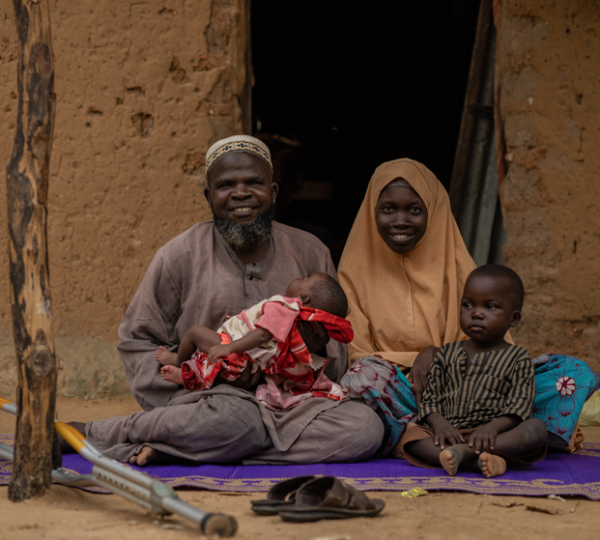Can a passionate workforce make up for the shortcomings in our PHCs?
By Chibuike Alagboso (Lead Writer)
The effective delivery of healthcare has many dimensions. While the focus is largely on the patient who is receiving the care, the other integral part is the healthcare workers who deliver the care. They and other non-medical staff make up the whole gamut of Human Resources for Healthcare (HRH), critical for an efficient health system. The World Health Organization’s (WHO) Global Strategy on Human Resources for Health states that improving health service coverage and realising the right to the enjoyment of the highest attainable standard of health, is dependent on the availability, accessibility, acceptability, and quality of health personnel.
The availability of effective HRH also has a positive impact on Sustainable Development Goal 3, which looks to ensure “good health and well-being”. Dr. Tedros Adhanom Ghebreyesus, WHO Director-General recently emphasised the importance of human resources for health as an important building block that enables the achievement of SDG 3. “Without workforce, SDGs 3 can’t happen and from the building blocks of the health system, the most central is human resources,” said Dr. Tedros, stressing the need for speed, volume and quality to close the “unacceptable” 18 million health worker gap projected by the United Nations.

Nigeria’s share in the projected shortfall in the health care workforce is unknown. Yet, WHO’s Workforce Alliance factsheet for Nigeria show HRH availability of physicians, nurses and midwives per 10,000 population is 20.1. A further breakdown shows the number to be 4 for physicians and 16.1 for nurses and midwives combined. Healthcare professionals continue to leave Nigeria in droves every year to seek better working conditions in other countries. There has been an increasing trend where some of these health professionals return to practice in Nigeria , after acquiring specialist training outside Nigeria, building valuable global networks. However, this brain gain is not enough to match the significant healthcare demands facing Nigeria, especially at the primary healthcare level.
Making a Difference
In Waru, a community on the outskirts of Abuja, two health workers are trying their best to close the gap between demand and supply. A misconception about major cities like Abuja is the assumption that every resident has access to basic social services like healthcare. This isn’t always the case as there are communities both within and outside the city where people lack access to basic healthcare.

For Mrs Roseline Edozie who serves as the nurse midwife and Mr Ibrahim Akawu, the officer in charge of Waru Primary Health Centre (PHC) , they are passionate about ensuring people in their community receive the best healthcare they can offer. Waru PHC offers services such as immunisation, antenatal and post-natal care, family planning counselling and service delivery, basic laboratory investigations and treating minor ailments. Once it gets beyond their capacity, they refer patients to nearby hospitals like the Garki General Hospital located about 15km away from the community. As a primary health caregiver, Mrs Edozie is willing to work in any rural community, no matter how remote. “No matter the location, I don’t mind going there to work. It’s my work as a nurse midwife,” she said.

She was transferred to the facility in November 2017 from the primary health centre in Kabussa, another rural community in the FCT. Although Waru PHC runs out-patient services, Mrs Edozie lives within the facility with her family and is called to attend to patients at any time of the day. The poor attitude of previous health workers in the PHC discouraged community members from visiting the facility.
This led to Mrs Edozie organising advocacy visits to the district head of Waru community and other community members, encouraging them to start using the facility again as there had been changes. Over time, this paid off as the use of the facility improved. Currently, the facility has its weekly antenatal sessions on Tuesdays where she attends to over 40 pregnant women. In January 2019, 57 patients accessed various family planning services in the facility while 16 women gave birth. Despite the poor power supply in Waru PHC that cripples their services, Mrs Edozie remains undeterred. She narrated how three women went into labour the night before, without any power supply. She depended on the relatives of the pregnant women to provide lighting through whatever available means like torches and cellphone as the women were giving birth. Mr Akawu said they can’t stop work because of the challenges as they are expected to make the best of what they have to serve their patients.

Going Above and Beyond Challenges
Volunteers play a significant role in ensuring the smooth running of Waru PHC. According to Mr. Akawu, the government pays the wages for only two staff members, himself and Mrs. Edozie, the nurse midwife. The six volunteers who work at the PHC are not paid by the government and are given stipends from the revenues generated at the centre.
One of the volunteers, Comfort Dio was posted to the facility by N-Power, a federal government initiative that seeks to reduce unemployment rates by posting individuals with various skill sets to places where a skills gap is identified. Although Dio has not been paid since joining the scheme, she is happy to volunteer in the facility and even take on bigger responsibilities. She currently serves as the immunisation and surveillance focal person for the community and is responsible for coordinating outreach programmes to immunise children in the health centre’s catchment areas. These areas include Zinda, Chafi, Shape and Yimutu where there are no health centres and are accessible by two-hour motorcycle rides. Akwawu said they have fallen off the motorcycles while travelling to these communities as a result of its poor condition. But they are still not deterred. Their health centre was recently rated as a top performing facility for immunisation by the health department in the local government council as they immunise over 200 children on their immunisation days, as indicated in their neatly kept records.

A close partnership and relationship with community members is also instrumental in the PHCs success. Akawu said some community members occasionally gave them gifts as a token of their appreciation for their services. A quick trip to the palace of the District Head, HRH Ibrahim Sarki clearly showed the extent of this cordial partnership. The traditional ruler greeted him as “my son,” and invited him into his private chambers where he receives important guests. He expressed delight for their work which he said has brought great relief to the community. With 15 communities under his watch including an internally displaced persons camp with 4505 residents, the health centre is now the first port of call whenever there is a health challenge. Community members also appreciate the efforts by the team at the health facility even though they are aware of the challenges they face. 34-year-old Chibuzor Ihesie operates an electronics sales and repair shop about four blocks from the health centre. He visits the facility occasionally when any of his three children fall ill. He says the PHC lacks a lot of things, but he believes they are doing their best. He plans to stop having children after his fourth child by visiting the centre for family planning services. Another community member, Mrs Peace Ani, 34, said she delivered her fourth and last baby at the facility and is happy with the services provided. She had two children before moving into the community with her husband but didn’t deliver the third in 2015 at the facility because she had heard about the poor attitude of the staff then.

Mr Akawu listed power supply, space and staffing as the major challenge they face at the facility. For over 10 months, they hasn’t been any power supply at the health facility, even though the community has power. The power supply was disconnected by the electricity distribution company because the PHC had an accumulated unpaid bill of around N200, 000. His colleague, Mrs Edozie said she got tired of going outside the health centre to iron her work uniform, so she resorted to wearing her uniform without ironing it. Mr. Akawu also mentioned that the laboratory where basic laboratory tests were conducted and the dispensary where medication was stored and dispensed was constrained in space, with little or no space for those who worked there.
Despite any progress that might have been made in providing more health workers for PHC facilities, there is a need for continued political commitment towards improving human resource for health and this requires significant investment in capacity development. It requires intentional efforts to create opportunities, that will deploy health professionals where their services are most needed and most importantly, create incentives to retain them. We can replicate proven models like the Women for Health program in Northern Nigeria where young girls are trained as midwives and redeployed to work in their communities.
The 18 million human resource for health shortfall by 2030 is only a projection and can be forestalled if the government can invest creatively to address the challenge. 11 years might seem like a long time to get it right, but it must start with an honest intention to make a difference in the life of just one Nigerian.




